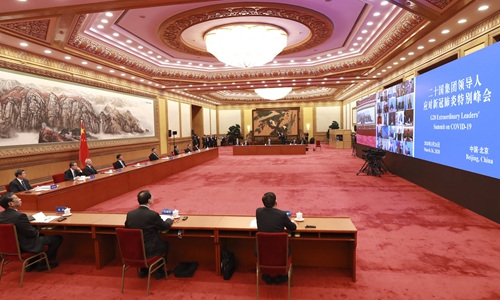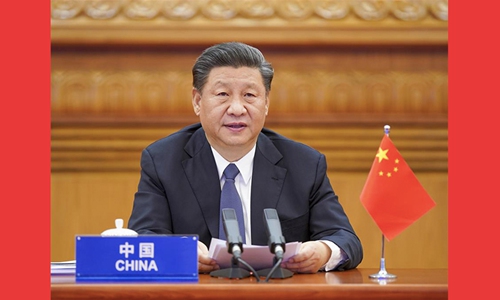
Chinese President Xi Jinping on Thursday delivers a speech titled "Working Together to Defeat the COVID-19 Outbreak" at the Extraordinary G20Leaders' Summit via video link in Beijing. Photo: Xinhua
Leaders of G20 members vowed on Thursday that they would take "all necessary" measures in areas such as information sharing, vaccine research, medical supplies and economic stimulus of over $5 trillion to contain the global coronavirus pandemic and minimize the economic and social damage, following a rare leaders' summit that marks a watershed for the global mechanism on public health emergencies.
Addressing the video conference, the first global summit of such high level since the pandemic broke out, Chinese President Xi Jinping called for solidarity and the "strictest" measures to fight a "common enemy" and pledged China's continued support for global efforts to rein in the epidemic and stabilize the economy.
The G20 Extraordinary Virtual Leaders' Summit on Thursday comes at a time when the pandemic rages across the world. The deadly disease has caused 480,000 infection cases with more than 22,000 deaths.
The first virtual summit of G20 since the group was founded in 1999 aimed to foster a global consensus in countering the threat of the novel coronavirus pneumonia (COVID-19), which has considerable human, social and economic implications.
The world needs to be resolute in fighting an all-out global war against the COVID-19 outbreak, Xi said.
A virus respects no borders, and all must work together to build a strongest global network of pandemic control and treatment that the world has ever seen, Xi said.
Xi pledged that China will make greater efforts to supply medicine, daily necessities and disease prevention materials to the global market, according to the Xinhua News Agency.
He called on G20 members to take joint action and inject energy to revive the global economy by reducing tariffs and lowering trade barriers.
Without coordinated international economic action the coming recession will be much worse than after the global financial crisis in 2008, John Ross, a senior fellow at Chongyang Institute for Financial Studies of Renmin University of China, told the Global Times on Thursday. "China's call for coordinated international action medically and on the economy is absolutely vital," he said.
Xi also urged enhanced international macro-economic policy coordination to prevent the world economy from falling into recession.

Chinese President Xi Jinping attends the G20 Extraordinary Virtual Leaders' Summit on COVID-19 via video link in Beijing, capital of China, on Thursday. Photo: Xinhua
Global action plan
As a multilateral group founded in 1999 after the Asian financial crisis, G20 has started to play a crucial role in coordinating global action in the face of major crises, particularly its response to the financial crisis in 2008. And the establishment of G20 is also considered as considerable changes in the international economic and political landscape as it attaches growing importance to emerging economies.
Some officials from different countries and organizations also called for galvanizing a stronger global effort to contain the pandemic. European Commission President Ursula von der Leyen said leaders of the members need to be prepared to restart economies and the international community should work together on development of vaccine while keeping global supply chain flowing.
Overwhelmed by the pandemic, some countries are only focusing on their internal problems without providing help to each other, while others will not be able to escape being seriously affected by this crisis without a global coordinating public health mechanism, which is unsustainable, Li Haidong, a professor at the Institute of International Relations of China Foreign Affairs University, told the Global Times on Thursday.
"It's time to come up with a global governing system for tackling public health emergencies on an international scale," Li said, noting that the financial resources needed for tackling the pandemic could be allocated and coordinated under the G20 mechanism.
Major multilateral financial institutions also called on G20 leaders to allow the poorest countries to suspend all repayments of official bilateral credit to help them tackle the challenges brought by COVID-19, according to an email sent to the Global Times by the IMF.
David Malpass, president of the World Bank, said this will provide critical support and shorten the time to recovery, as some economists have projected that the pandemic will trigger another financial crisis or recession following the shutting down of businesses and people losing their jobs.
China, among the first group of countries to be severely struck by the disease, was also the first one to fully mobilize and coordinate resources on a national scale to fight this battle, providing a set of experiences to the world, including always prioritizing people's lives, establishing a highly efficient response and command mechanism, mobilizing people from all levels and taking a transparent approach in communicating with the international community, Chinese officials said at a press conference on Thursday.
Compared to the G7, another international intergovernmental economic organization, the G20 is more open and plays an incomparable role in helping to stabilize the world economy and ensure social stability, something that cannot be easily achieved by other multilateral organizations, analysts said.
"More importantly, G20 members embrace the core ideas and propositions of the UN, enabling it to become an effective tool in helping safeguard global economic safety," Li said.
The WHO chief Tedros Adhanom Ghebreyesus called on G20 countries in a press briefing on Tuesday to stand in solidarity in ensuring protective equipment supplies in the midst of the COVID-19 pandemic.
As a health agency of the UN, the WHO has limited power in coordinating resources, while facing pandemic, a much more proactive and effective global health emergency response mechanism should be taken into consideration, according to analysts.
Wang Hongwei, a professor at Renmin University of China's school of public administration and policy, told the Global Times that different countries that keep pace with each other on the pandemic battle can promote experience communication and material exchanges.
It will also avoid the virus flowing back to areas that have already made achievements in controlling domestic epidemic, Wang said.
G20 leaders agreed at the summit to take all necessary health measures and seek to ensure adequate financing to contain the pandemic and protect people, especially the most vulnerable, and aim to establish a global initiative on pandemic preparedness and response.
Another financial crisis?
In tackling the financial crisis in 2008, G20 was successful, some analysts said, noting that this meeting at such critical moment aims to tackle global economic crisis, which needs effective and coordinated measures in facing a looming recession.
While the meeting itself focused primarily on cooperation in containing the coronavirus, it is also imperative for all countries through the G20 to coordinate a response to the economic fallout from the pandemic, with trade and investment all affected, said Huo Jianguo, vice chairman of the China Society for World Trade Organization Studies.
"First and foremost, there needs to be coordinated stimulating policies to keep the global economy running, particularly fiscal and monetary policies, to support businesses and consumption. That's what G20 is designed for," Huo told the Global Times on Thursday.
Apart from immediate economic relief measures, countries must also come up with a plan to remove barriers for trade and investment, instead of raising barriers, he said. "This is a time to take whatever it takes to facilitate trade and investment rather than trade wars and decoupling," Huo said, adding that China and the US, the two biggest economies, should also ease their trade tensions and remove tariffs to facilitate trade.
Finance ministers and central bank governors were urged at the summit to coordinate on a regular basis to develop a G20 action plan and work closely with international organizations to swiftly deliver the appropriate international financial assistance.
Member countries pledged to continue conducting bold and large-scale fiscal support besides injecting more than $5 trillion into the global economy, supporting the measures taken by central banks in supporting the flow of credit to households and businesses.
President Xi's comments on the need for G20 members to take measures to reduce tariffs and remove trade barrier speak to a pressing issue that puts a strain on the global economy, said Dong Dengxin, director of the Finance and Securities Institute at Wuhan University of Science and Technology.
"While all countries have taken fiscal and monetary policies to support their domestic economies, barriers on trade remain and have not been addressed," Dong told Global Times on Thursday, pointing to existing US tariffs on hundreds of billions of dollars worth of products from China and other countries.
Contact: Ms. Chen
Phone: 13799290896
Tel: 13799290896
Email: 326488291@qq.com
Add: